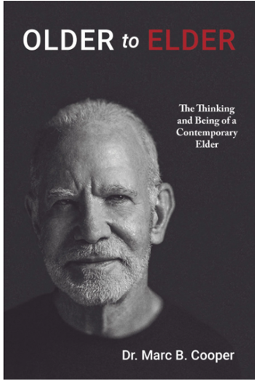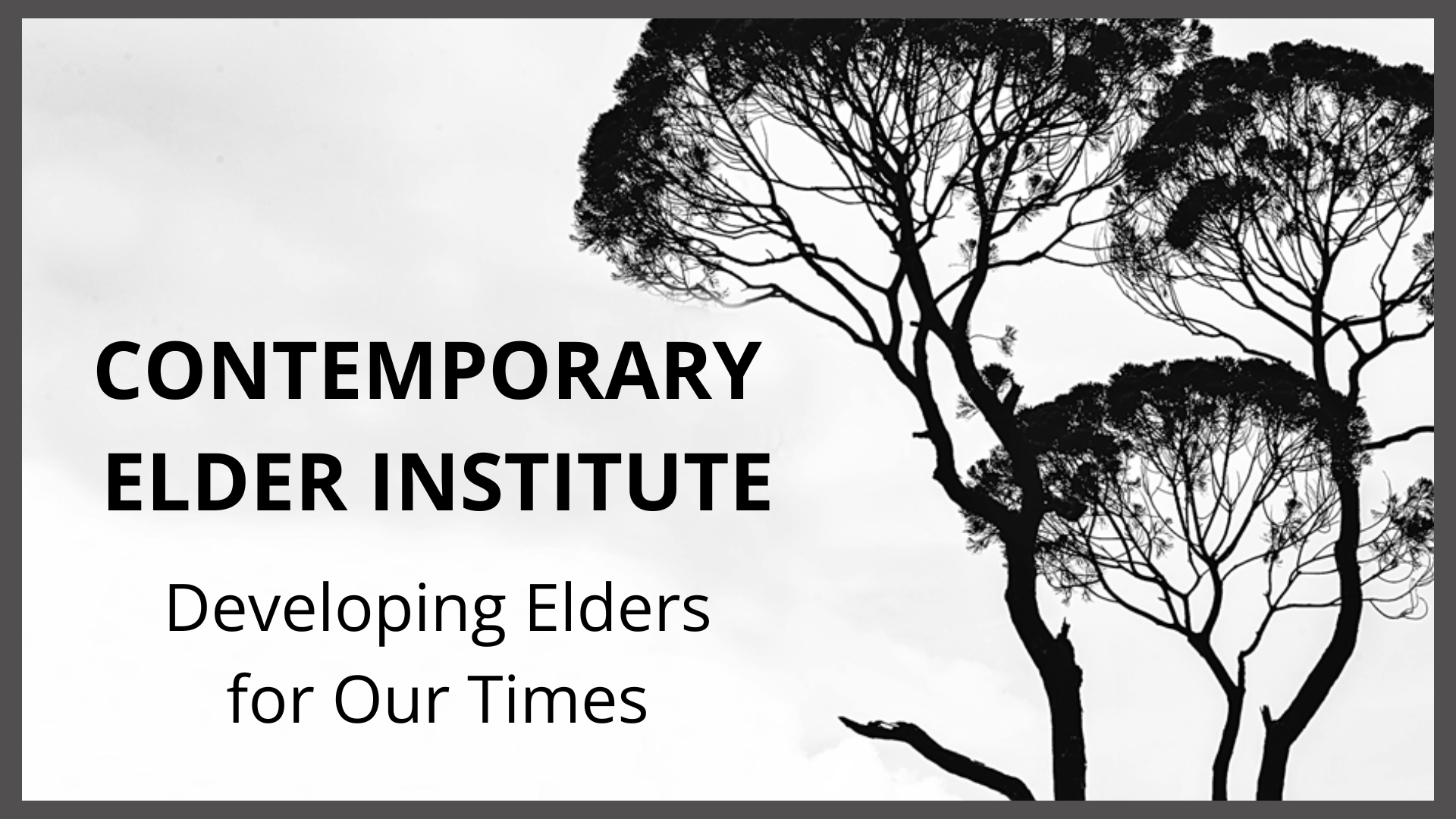ELDERS CLEAVE
ELDERS CLEAVE

Cleave is part of an exclusive lexicon whose members are "contronyms," words with two contradictory meanings.
In the case of cleave, the two meanings belong to two etymologically distinct words. One cleave means "to adhere firmly and closely or loyally and unwaveringly," as in "a family that cleaves to tradition;" it comes from the Old English verb clifian, meaning "to adhere."
The other meaning, cleave, relates to splitting and dividing, coming from a different Old English word, cleofan, meaning "to split." Cleave perfectly describes what elders practice to enhance their ability to consciously and emotionally dwell in life's paradoxes, notably the paradoxes of life and death.
A paradox is a statement or situation that appears contradictory or absurd but reveals a deeper truth or significant insight. Both sides of the paradox exist for the elder at the same time.
A paradox involves two seemingly incompatible ideas that, when considered together, reveal a more profound understanding or challenge common assumptions, such as death is the end is the end of existence.
Elders are equally conscious of both sides of the paradox, bringing them together to harmonize the contradictions and foster insights and inner serenity.
Elders transcend societal pressures and expectations, freeing themselves from being overly influenced by societal norms or collective thinking. This severance is liberating, allowing elders to cultivate a more profound sense of self-awareness and personal autonomy.
Elders can cleave harming circumstances of life, especially their late aging, into the various pieces of the circumstances and "adhere" them in new ways that provide insight.
Cleaving opens the door to higher wisdom for elders. To cleave involves a deliberate process of seeking deeper understanding and enlightenment beyond conventional knowledge.
By cleaving, the door to higher wisdom opens. Cleaving allows elders to move beyond merely existing and begin to thrive, experiencing a more profound sense of purpose, fulfillment, and connection with the world around them.
THE ELDER'S PARADOXES
Elders learn to be with both sides of the paradox simultaneously, with the same intensity for both, to get to that place in the middle where insight and revelation occur.
Elders grow and become stronger through facing challenges and adversity, yet naturally seek comfort and avoid discomfort.
Elders value freedom and independence, yet they realize too much freedom can lead to chaos; constraints and boundaries, while restrictive, provide structure and meaning.
Elders strive for individuality and uniqueness, yet they also deeply need to belong to a community or group.
Elders crave stability and routine for security, yet growth and progress require them to change and adapt constantly.
Elders seek control over their lives and circumstances, yet true peace often comes from accepting things they cannot change.
Elders do not want to die, but they know death is irrevocable.
These paradoxes are the dualities elders constantly and consciously reside in as they journey through late life. The results are insight, revelation, serenity, lightness, and loving-kindness. To get to this place within a paradox, elders learn to cleave.
CLEAVING
"Cleaving," in the context of elders, enables them to see or understand multiple perspectives simultaneously. Elders have a deep understanding gained through experience and wisdom, where they can grasp conflicting viewpoints without feeling torn or conflicted. Elders get good at splitting apart and bringing together.
This ability to cleave allows elders to navigate complex situations with greater clarity and empathy, offering insights considering various angles and nuances. It's a practice elders value for promoting understanding, harmony, and wise decision-making.
Elders consciously cleave previous aspirations and beliefs, which had been the bedrock upon which they built their lives. Elders come to realize that this bedrock has turned into a marshland. Time to move to higher ground.
As elders traverse the journey of late life, cleaving allows them to deal with growing old's dualisms. Seeing both sides at the same time allows a deeper self-understanding. Their body is decaying while their consciousness is expanding. The perfect paradox.
HOW ELDERS CLEAVE
Elders recognize that their previous ideals, traditions, and relationships are concepts. Concepts are abstractions, intangible models created to explain things but are not those actual things. It's like pointing to the moon, but it is not the moon. This recognition is a key to an elder's enlightenment and open-mindedness.
Elders realize adherence to these past concepts has shaped their younger and middle-aged identities and bound them to values and principles defining their sense of self and purpose. They realize these concepts are not the truth. Concepts about life are not life.
Concepts have building blocks. Cleaving separates each block of the concept. This allows elders to consciously detach themselves from the gravitational pull of the "whole." Now, they can relate to the cleaved parts rather than the whole. Much easier to handle a piece at a time than try to fix the whole. Cleaving gives them patience, accuracy, and less effort.
The ability to cleave delivers a subtle yet undeniable shift in perspective. The certainties of youth give way to the complexities of experience, displacing their once steadfast adherence to certain "truths." To paraphrase one of Gandhi's statements, "Only God knows absolute truth. I only know relative truth." Cleaving turns absolute truth into relative truth.
Cleaving allows elders to navigate the complexities of aging. It reminds them that growing old emerges from reconciling opposing forces—cleaving to what matters most while cleaving away what no longer serves.
Thus, in the paradox of cleaving, elders find not just contradiction but a profound harmony in growing old's journey.
Elders perform the delicate dance between holding on and letting go, embracing tradition and accepting change. Cleaving is the elder's path to wisdom.
Announcements:
The Book:
Phase I of our prelaunch begins. The prelaunch invites people to be Patrons for the book's success and for the mission to become realized. We are doing the prelaunch in stages over August.
Curious? Find out about being a patron at www.drmarcbcooper.com

“We live in a time of few ... voices unafraid to be both old and wise. We need the wisdom of elders—especially those who grew up before the digital great tsunami and who can guide us toward a world that is at least halfway human. Dr. Marc Cooper is one of those voices.”
— Charles Jennings —author of Rise of the Lightspeed Learners and The Hundredth Widow
“Marc Cooper’s From Older to Elder is a manifesto for a different vision of aging in which our opportunities and contributions are virtually unlimited...The experience and wisdom we’ve accrued is an asset in demand more than ever in today’s world.”
— Jim Selman —founder of The Eldering Institute and author of Living in a Real-Time World
“Today, many of us are attempting to make a transformation from lives of doing and achieving to lives of being and giving. From Older to Elder provides us with a language and context large enough to ... embody the transformation from an older person to a “contemporary elder”... I see this fine book as my owner’s manual for the next life stage!”
— Art Haines —VP, Evergreen Health Medical Center Board Director, Conserve Southwest Utah
The Sangha:
The Sangha has grown, evolved, and transformed. It has become its own unique and powerful expression in the world. It has entered its next stage of development and transformation.
Starting August 1st, the Contemporary Elder Sangha will operate independently from the Contemporary Elder Institute. The desired outcome has become achieved. A self-sustaining, self-governing, self-developing body. The Sangha is all grown up and leaving home to do its work in the world.
For future communications and announcements about calls, retreats, podcasts, YouTube videos and other information about the Sangha, please visit:
www.contemporaryeldersangha.com.
All future emails and Zoom call invitations will come from contemporaryeldersangha@gmail.com.
The Sangha has consciously evolved into a remarkable support, connection, transformation, and shared wisdom community. Each call is different, but each call brings you back to who you indeed are – for and to yourself, others, and the world.
The Next Sangha call is August 14th. If you are on their mailing list, you will receive a Zoom invitation from the Sangha at their own address inviting you to this meeting. Be sure to visit their website to sign up for their emails if you would like to attend future calls.
The Contemporary Elder Institute
No rights reserved | Take what you want
Address: Portland, OR 97210
Loreto B.C.S. Mexico 23887
